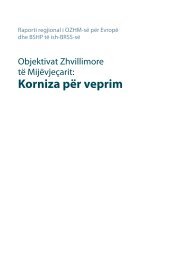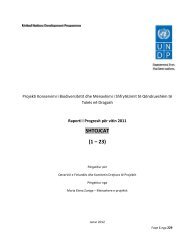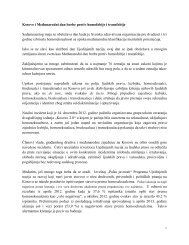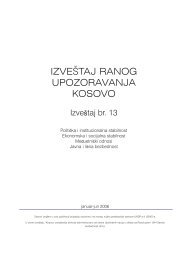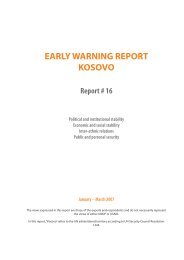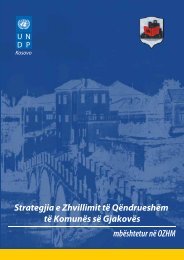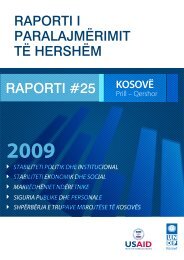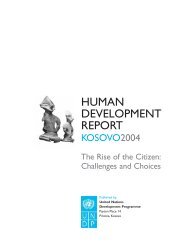Kosovo Human Development Report 2010 - UNDP Kosovo - United ...
Kosovo Human Development Report 2010 - UNDP Kosovo - United ...
Kosovo Human Development Report 2010 - UNDP Kosovo - United ...
You also want an ePaper? Increase the reach of your titles
YUMPU automatically turns print PDFs into web optimized ePapers that Google loves.
The UN’s <strong>Human</strong> <strong>Development</strong> <strong>Report</strong>s<br />
(HDR) were the first to identify a<br />
close inter-linkage between national<br />
development and the fairness and inclusiveness<br />
of a country’s social base.<br />
In the two decades since the first HDR<br />
appeared, published by the <strong>United</strong> Nations<br />
<strong>Development</strong> Programme (<strong>UNDP</strong>),<br />
“social inclusion” has grown into a partner<br />
theory of human development. It is<br />
defined as a fair and mutually-empowering<br />
relationship between individuals<br />
and broader society – along with its<br />
norms, laws and institutions – allowing<br />
individuals equal capacity to fulfill<br />
their potential. Based on this definition,<br />
the UN has promoted human development<br />
and social inclusion as more accurate<br />
and deeper measure of national<br />
progress than economic growth alone.<br />
Social inclusion has particular meaning<br />
for <strong>Kosovo</strong>, as it reaches a critical<br />
decision point in its history. <strong>Kosovo</strong>’s<br />
sights are set on parity with other European<br />
nations as well as EU membership<br />
in the near future; however,<br />
both of these goals will require a considerable<br />
course change in current<br />
economic and governance trajectories.<br />
<strong>Kosovo</strong>’s macro-economic and<br />
traditional social indicators are not<br />
encouraging, with limited growth of<br />
Gross Domestic Product (GDP) failing<br />
to reduce the 48 percent unemployment<br />
rate, a poverty rate stagnating<br />
at 45 percent, Europe’s highest fertility<br />
rate and ongoing discrimination<br />
Executive Summary<br />
between ethnicities, as well as against<br />
women.<br />
To assist <strong>Kosovo</strong> in transforming this<br />
picture, the <strong>Kosovo</strong> HDR seeks to define<br />
and explore the concept of social<br />
inclusion as it applies to <strong>Kosovo</strong>’s socio-economic<br />
balance. It analyzes how<br />
exclusive policies and practices affect<br />
the economic sphere, both in terms of<br />
access to means of income and access<br />
to life’s critical necessities. It examines<br />
exclusion as it affects Kosovans reaching<br />
for education and a basic standard<br />
of health. Finally, it looks at how gaps<br />
in these sectors are influencing public<br />
trust and eroding participation in <strong>Kosovo</strong>’s<br />
hard-won democratic process.<br />
The report analysis is based largely on a<br />
survey of the perceptions of more than<br />
6,400 respondents entitled <strong>Kosovo</strong><br />
Mosaic Survey: “Public Services and Local<br />
Authorities in Focus”, published by<br />
<strong>UNDP</strong> in 2009. It also synthesizes the<br />
findings of a wide range of other reports<br />
and surveys, as well as the more<br />
limited data available from <strong>Kosovo</strong>’s institutions<br />
and Statistical Office.<br />
Some of the findings herein are surprising<br />
and counter-intuitive. For example,<br />
economic growth and even active<br />
employment have not protected<br />
the most vulnerable Kosovans from<br />
poverty. Nearly a third of those unable<br />
to meet critical needs have jobs paying<br />
less than a survival wage for their<br />
families. Urban areas are more vulner-<br />
EXECUTIVE SUMMARY<br />
| 11



